A secure off/on-line wallet approach for multiple cryptocurrencies
( )
)
It's nothing real new, but I want to share my plan for a secure off/on-line wallet(s) for multiple coins. Maybe someone has some additional ideas, suggestions, or just tries to replicate and share.
Basically I think, given the huge increase in value of cryptos, it does not make these suitable anymore to be stored on any web wallet, and also not in a desktop wallet that is always online and prone to hacking. The risk is simply too high. A paper wallet though is not really secure either, may get lost, burnt, whatsoever.
So my approach, put all of them into a secure virtual machine, that by default stays offline, but can easily be activated if needed for any transaction.
I summarize the steps to take, can of course be modified, as a general guideline.
First step, install a VM, can be VMware, Virtualbox, does not matter, and install a blank fresh version of Windows (I use 7) on it. Basically that is the same as buying a new computer. Encrypt it if possible (VMware can do that).
Second step, harden the installation. Update Windows to the latest patch/update level, you may remove MS Spyware with Ancile (https://voat.co/v/Ancile/1677949) for additional security. Disable any remote access. You may browse for a hardening guide, if you really want to. Usually swap space is also not needed and could store sensitive information. Disable.
More importantly, install some up-to-date and updating Virus/Anti-Malware Tool. Bitdefender Free is in the moment my tool of choice. And also some firewall control, that can close down everything that is not needed (TinyWall for me). Simple, but efficient. No need for any commercial bloatware, all available for free.
Then you should test the new installed system, make sure that everything works as needed. Don't install anything else, maximum perhaps a secure browser, like Brave. IE cannot be recommended by anyone for anything, so stay away from IE.
Third step, install the wallets/client of your choice, depending on your coins. For me it is BTC, ETH, LTC, BCC and Ripple. Yours may differ, and so does the selection of clients.
I use Electrum for BTC, Exodus for ETH and LTC, Electron for BCC and the Ripples I leave on Kraken for now. Rippex (rippex.net) also have a desktop client for XRP, if you want to give it a try, but it is a company in Brazil. The wallet itself is a fork from a former Ripple wallet.
Install your coin clients, create fresh wallets for each and import either the private keys or simply use the seeds. If the virtual machine is online you should get an updated balance in a short time, this is what you want, your data is there now.
Fourth and last step. Shut down your virtual machine. Make a backup of it, hard disk space is cheap. Put it somewhere safe. Make multiple copies, you can encrypt (and pack) them if not already. You can now delete your online wallets wherever you have them. Be sure to also delete the associated wallet data, usually under your user profile\Appdata\Roaming. You don't want to leave these data in the open.
All done. For balance monitoring purposes, without touching any real wallet and key, there are several options. I use Blockfolio on my Android phone and can safely see any balances moving, if anything happens, just switch on the VM and you will be able to do any transactions deemed necessary in no time.
A secure solution for an Off/Online Wallet with multi currencies. Or so I hope.
Further ideas welcome.
Mac
(photo: pinterest.com)
good info .... and please upvote my post for increase my happness
Just checked, it is also possible with Virtualbox to create an encrypted VM.